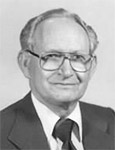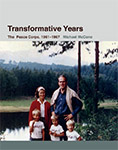Mike McCone takes on the U.S. Ambassador in Malawi
WHEN MIKE MCCONE arrived in Malawi as the new Peace Corps Director in August of 1965 he met PCV Paul Theroux who was teaching in Blantyre at the teacher’s college, Mike told me when I interviewed him for an article I wrote about Theroux for the January 1998 issue of RPCV Writers & Readers. Theroux asked for McCone’s permission to resume publishing the Volunteer newsletter, The Migraine, which the previous director had banned because the first issue had an editorial by Paul critical of U.S. policy on South Africa.
McCone told Paul he could publish the newsletter.
Theroux put together the next issue of The Migraine which was full of prose and poetry, facts and fiction, plus opinion pieces. In this issue, Paul had a two-paragraph editorial critical of U.S. policy in Vietnam.

Ambassador Gilstrap
As a routine matter, McCone sent a copy to the U.S. Embassy in Blantyre. Two weeks later, when he was on an upcountry trip from the capital, he gets an urgent call to a school he was visiting. It was from the American Ambassador, Sam Gilstrap.
Gilstrap was a career State Department employee and served with LBJ “way back in the Texas Youth Authority days.” He was near the end of his career and wangled the ambassador’s job from his old friend.
“What is this treasonous vomit?” were his first words to McCone and his deputy Will Lotter. The session lasted 30 minutes. The highlights of the conversation were:
Gilstrap: “How could you let these people print this?”
McCone: “They are American citizens and they are entitled to their opinions.”
Gilstrap: “But they are in a foreign country and are representatives of the U.S. government.”
McCone: “No, sir, they are representatives of the American people.”
Gilstrap: “But this was printed on paper bought by the U.S. government on a U.S. government mimeograph machine, right?”
McCone: “Yes.”
The capper to the conversation was the statement by the Deputy Chief of Mission who said the problem with incidents like this was that it showed our country was not united on this issue and that weakened our position internationally. McCone pointed out that The Migraine was distributed to PCVs only and that he had sent a copy to the embassy and it took two weeks to surface in an office that employed four Foreign Service Officers.
Gilstrap cabled the State Department and the White House. Shriver asked McCone to come to Washington, where he ended up staying some 11 weeks while the Peace Corps decided what to do with him.
Shriver had just taken over the War on Poverty in addition to being head of the Peace Corps. He was loaded with work, but he finally saw McCone one afternoon and asked Mike to go home with him and have dinner while they talked.
At dinner, with Shriver and Eunice Shriver who was fully attentive to his story and at the end of the meal, Shriver asked McCone, “Are you bitter?”
McCone paused a moment before replying no he wasn’t bitter because what he did and said was what he thought was right.
At the time, the chief of the Africa desk at the State Department was the great liberal, G. Mennen “Soapy” Williams, but McCone guesses there was a supporting cast of many that believed they finally had the Peace Corps in their sights and they were going to pull the trigger.
But at the time, Warren Wiggins was the Deputy Director of the Peace Corps, and backed by Shriver, he led the fight to keep McCone in the agency. It took time to come to a conclusion.
The compromise — after 11 weeks, and Christmas was a week away, and his wife and three small children were still in Malawi — was that McCone would be assigned to another country as a deputy. Shriver gave him a raise in pay and when the State Department said he couldn’t return to Malawi to pick up his family, Wiggins told them that was unacceptable, flat out no way.
 MaCone returned to Blantyre, spent Christmas there with his family, and three days later he flew out to stints in Nairobi, Calcutta, Bangkok and finally Kuala Lumpur and wended his way to Sarawak as head of that portion of the Malaysian program.
MaCone returned to Blantyre, spent Christmas there with his family, and three days later he flew out to stints in Nairobi, Calcutta, Bangkok and finally Kuala Lumpur and wended his way to Sarawak as head of that portion of the Malaysian program.
In 2010 Mike would publish Transformative Years: The Peace Corps, 1961-1967.
AS FOR PAUL THEROUX . . . he arrived in Washington, D.C. ten days after McCone, having been thrown out of the country by Hastings Banda. The two of them had a nice reunion in D.C. for a day and then Theroux went on his way to his own fame and fortune.

No comments yet.
Add your comment